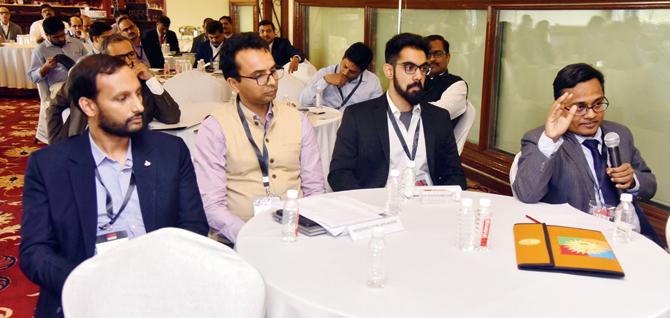Experts stress on the need to prepare for evolving methodologies at seminar on contemporary terrorism

IDSA research fellow Dr Smriti Pattanaik said that banning terror outfits alone can't tackle terrorism
The future may see terrorists resorting to unconventional methods over traditional warfare strategies for destruction. Experts studying terrorism, working on global crisis management and retired intelligence/defence officials pointed to this fact at a recent seminar on evolving trends in contemporary terrorism in Mumbai.
ADVERTISEMENT
The scourge of terrorism, most of their speeches stressed, has impacted nations worldwide and India, with Mumbai being among the worst hit. Beginning from 1993, the financial capital of the country has witnessed several bomb blasts and a major terror attack. However, the modus operandi of terror strikes has been changing over the years.

Panelists at the seminar stressed on being prepared for any kind of terror attacks. Pics/Pradeep Dhivar
IS-like module busted
Recently, the Maharashtra Anti Terrorism Squad (ATS) bust plots to poison water supply tanks and arrested nearly a dozen of youths for their alleged links with banned terror outfit Islamic State (IS).
According to the state ATS officials the youths picked up by the police were allegedly planning to make some poisonous chemical and mix it in water at an event that would result in a mass casualty. All the arrested youths are been remanded to police custody for further investigations.
A member of a global crisis management firm and a former defence correspondent from Delhi echoed similar views. "Everyone needs to prepare themselves for different methods of a terror strike. Identifying the changing methods is a bigger challenge before the society," he said.
'Ban on outfits no solution'
The seminar was organized by a GRID91-an India based risk consulting firm. Varun Kareparambil, chief executive officer at GRID91, said, "Terrorists are moving faster than ever. Their methods are evolving like never before. Managing the threat of terrorism is not an option for global corporations but a mandatory practice that needs to be built into their risk management programmes. The seminar was to bring together like-minded brains to discuss contemporary trends in terrorism."
Meanwhile, Dr Smruti Pattanaik, research fellow with Institute for Defence Studies and Analyses Pattanaik stated that banning an organisation doesn't solve the problem. "Post the ban, the group continues functioning silently. This makes it more difficult to track their activities," she added.
Elaborating on recruitments done by terror handlers, Pattanaik claimed that terror groups no more rely on traditional pockets for this. "There are cases where educated youths from rich families have joined radical groups," she added.
Ajinkya Naik, director, GRID91, said, "No one can predict who, where and what would be the next possible terror target. One thing we can do is prepare to avoid or face such threats if any. The aim of the seminar was to bridge the gap between corporate houses and professional security experts to deal with the situation for better and secured tomorrow."
Catch up on all the latest Mumbai news, crime news, current affairs, and also a complete guide on Mumbai from food to things to do and events across the city here. Also download the new mid-day Android and iOS apps to get latest updates
 Subscribe today by clicking the link and stay updated with the latest news!" Click here!
Subscribe today by clicking the link and stay updated with the latest news!" Click here!







